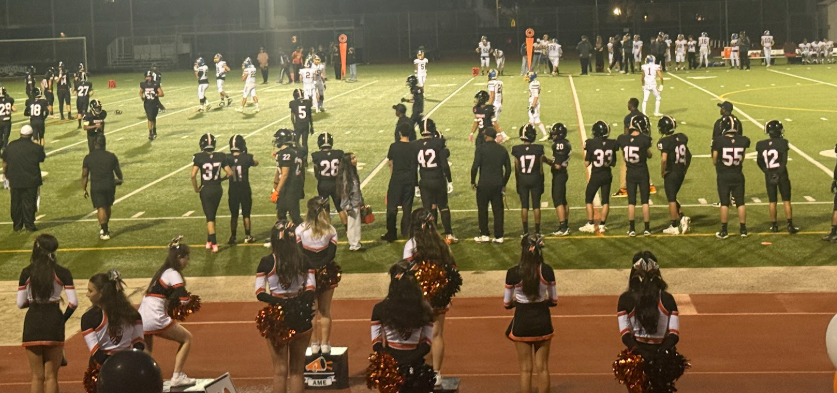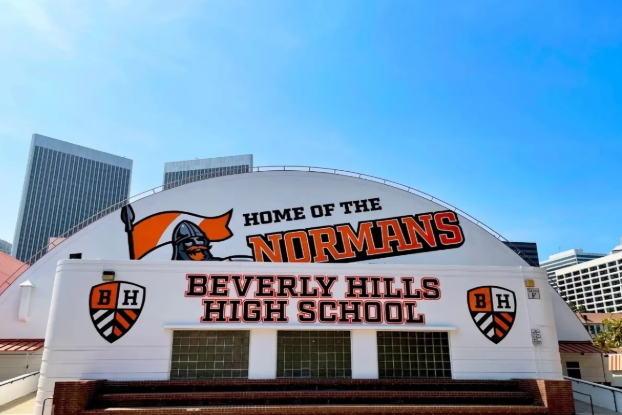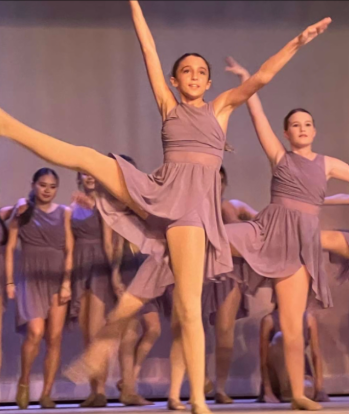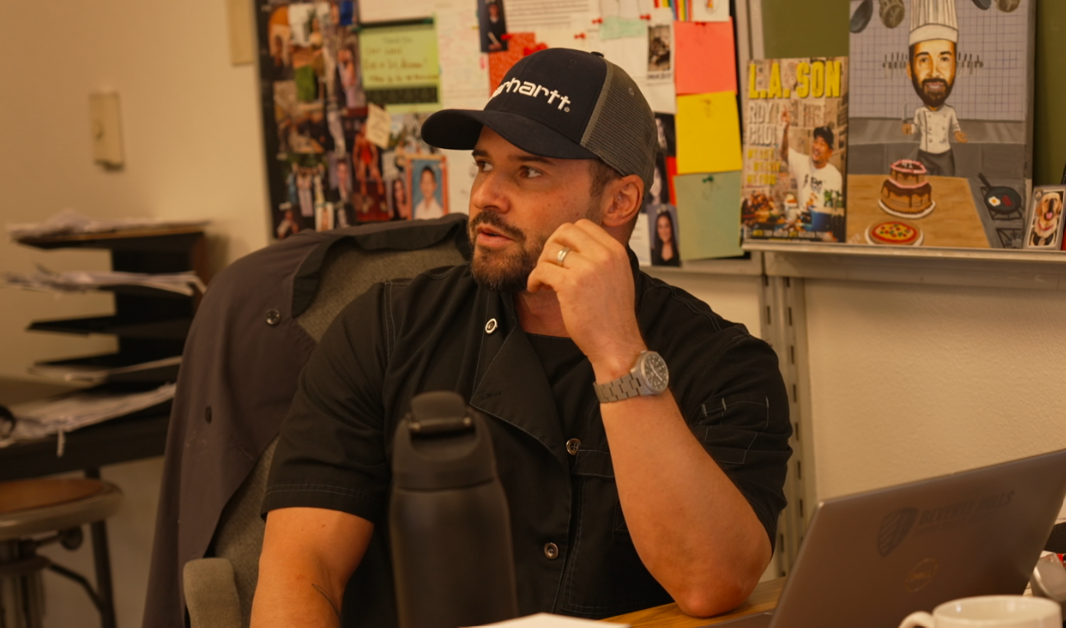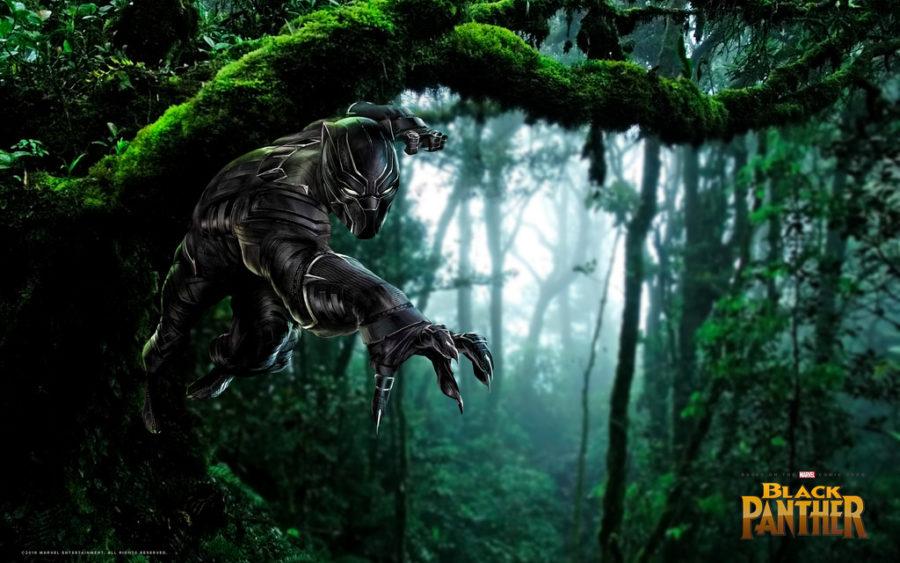“Black Panther” is Marvel’s latest marvel
Natasha Dardashti staff writer
A superhero fights in the name of justice, defeats villains with ease and swoops in to kiss the girl of his dreams– think you’ve seen it all before? Think again.
In Marvel’s latest superhero installment “Black Panther,” T’Challa (Chadwick Boseman) is the newly crowned king of Wakanda, a fictitious African nation that remains unscorched by the flames of colonialism. It is where high rise buildings tower among mountains kissing the clouds and levitating spaceships fly through rocky waterfalls–an awe-inspiring safe haven from the hardened grips of everyday life in the rest of the world. When Killmonger (Michael B. Jordan), a power-hungry radical, challenges T’Challa’s place at the throne, Wakandan traditions are thrown into disarray and T’Challa is forced to reevaluate the ideals of his nation.
Wakanda, and each character’s devotion to it, serves as a plot device throughout the film. The world-building of this nation, though, is a fusion of traditional African aesthetics and highly advanced tech combined to create an experience that is far removed from a typical fantastical universe. Elements of African culture are deftly woven into the high-tech scenery, weaponry, clothing, jewelry and lifestyle of all Wakandans, furthering the feeling that many Marvel movies give: a fictitious world grounded in potential.
The biggest twist behind Wakandan technology is the engineer, the ingenious princess Shuri, (Letita Wright) whose intellect easily beats out Tony Stark and Bruce Banner. As the creator of the train system and most of T’Challa’s cool superhero tech, Shuri stands as a blockade to stereotypes about both women and people of color in science; in a universe where scientists are able to craft web shooters and indestructible shields, a young black woman is still able to stand on top with her mind-boggling engineering capability.
However, Shuri is not the only trope-defying character in “Black Panther.” T’Challa’s superhero squad consists of a majority of female characters, but these aren’t just the typical butt-kicking scantily-clad side babes. They rival T’Challa in strength and wisdom, present their own case for the great moral dilemma of the film, and at times advance the plot in ways that would be impossible with T’Challa on his own. Though it takes a sideline, romantic plotlines in “Black Panther” do not chain down any character; rather, they help to spotlight certain traits in individuals that may not have been obvious otherwise.
The supervillian narrative, one that has been long past beat into the ground, is almost completely subverted by antagonist Killmonger’s performance. T’Challa exists as a Captain America-esque character: straight laced, morally just, fighting in the name of justice. Killmonger, however, turns T’Challa’s seemingly unquestionable moral idea of justice on its head by introducing ideas that are difficult to refute. Ideas of true “justice” are twisted by Killmonger’s experiences, and his story further complicates T’Challa’s existing belief in Wakandan tradition. Marvel has struggled to produce noteworthy villains with complex motives behind their evil, quickly resorting to the trope of a mangled antagonist with a greed for power. Killmonger, though, was all those tropes and more. Yes, he hungers for power, and yes, he has been deeply wronged in the past, but his cries for revolution are justified, and his commentary on black subjugation is personal. Killmonger’s uniquely crafted physique left him memorable and easily to empathize with, mixing a cocktail for one of the best villains in one of the best movies in Marvel cinematic history.
“Black Panther” has political undertones; though, it is evident that a majority cast of black actors in a multimillion dollar franchise is inherently political in itself. The film explores ideas that most people are uncomfortable speaking about in everyday conversations, so seeing a top grossing movie tackle them encourages questions that are necessary in today’s political climate. With its emphasis on black liberation and ingenuity, “Black Panther” gracefully opens an entirely new world mindset worth exploring, one that will hopefully spark social change.
–
“Black Panther” album pushes film to new heights
AJ Wolken staff writer
Among the massive marketing campaigns that Marvel made for the movie “Black Panther”, one of its biggest successes was the release of Black Panther: The Album. The project, headed by hip hop giant Kendrick Lamar, was released on Friday Feb. 9, and featured a star-studded lineup including the appearance of huge artists such as Khalid, Travis Scott, The Weeknd, SZA and more.
The album seems to take on the theme of the movie in that the instrumentals and lyrics are very African-tribe themed. Although some of the songs are used in the film, the album is iconic as its own production and is climbing the charts alongside the movie.
One highlight of the album seems to be the second track, “All The Stars,” featuring Lamar and SZA. The song mixes Lamar’s lyrical genius with the wavy R&B vocals of SZA to create a perfect track for the mainstream right now. Hopefully it will help expose SZA’s music to the world, as she was snubbed of a Grammy this past year.
An underdog song that has gained a lot of attention is “Paramedic!” Lamar brings SOB x RBE onto the track, a California-based rap group that is slowly gaining popularity. The track should also put many listeners onto the unconventional style of this newer rap group.
One song that greatly disappointed was “Big Shot,” featuring Lamar and Travis Scott. With two of the biggest names in hip-hop working together on a track, one would hope that it would be a banger. But the song’s decent beat is layered with a verse from Lamar that he had already used in a recent feature and a very subpar verse from Scott.
But even with this underwhelming track, the album more than exceeds expectations with plenty of hit songs on it to make up for “Big Shot.” The best song on the album is “The Ways” by Khalid and Swae Lee. Khalid is one of the biggest phenomenons in music right now, and this track is his first single outside of his American Teen album, excluding features. Although Swae Lee’s verse in the song is also solid, Khalid completely outshines him and is the reason that this song is so good.
The Black Panther album consists of all the essentials of a great album; it has slow songs such as “I Am” and “The Ways,” jazzy songs such as “Bloody Waters” and “Seasons,” upbeat songs such as “Redemption” and “Pray For Me,” and straight rap songs like “X” and “King’s Dead.” Through the album’s similar instrumentals and mixing of genres, Lamar has orchestrated a very memorable album that not only complements the “Black Panther” film well, but also may be one of the best albums of 2018.
Categories:
Review: “Black Panther” provides stellar storyline, music
February 22, 2018
1
0
Donate to Highlights
$125
$1000
Contributed
Our Goal
Your donation will support the student journalists of Beverly Hills High School. Your contribution will allow us to purchase equipment and cover our annual website hosting costs.
More to Discover







